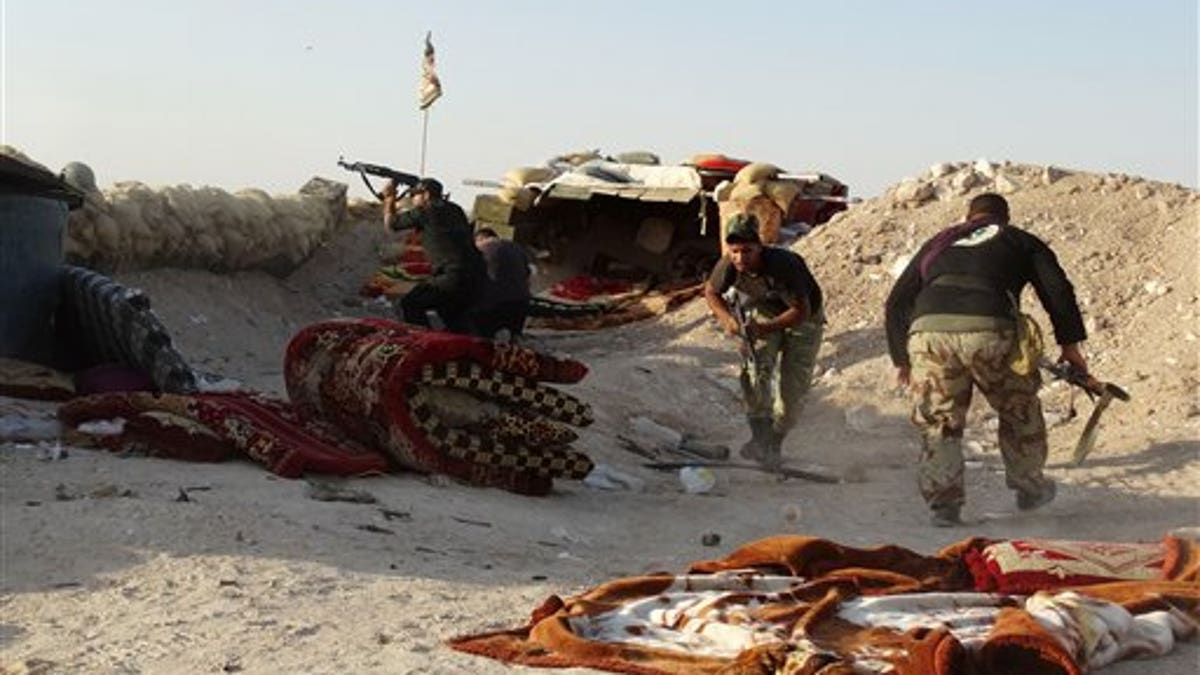
In this photo taken Monday, June 15, 2015, Iraqi security forces defend their positions against an Islamic State attack in Husaybah, 5 miles east of Ramadi, Iraq. (AP Photo)
The Iraqi government -- supported by Shiite militias from Iran -- launched a large-scale military operation to take out Islamic State militants from Iraq’s western Anbar province Monday.
The operation is under way to recapture Fallujah and Ramadi, a senior defense official at the Pentagon confirmed to Fox News Monday. The efforts are supported by Shiite militias, known as Popular Mobilization Units, from Iran and its proxy Hezbollah.
Photos of Iran’s Quds force Commander Qasem Soleimani visiting Shia militia units inside Iraq have appeared on social media since ISIS took over large portions of Iraq a year ago.
The defense official was unaware of any U.S. air support boosting the operation. It has been longstanding Pentagon policy to support only units aligned with the government of Iraq, but the line can be blurred as the chain of command for units operating in Iraq is not always known.
The spokesman for the Joint Operations Command, Brig. Gen. Yahya Rasool, said in a televised statement that the operation started at dawn Monday and that government forces are backed by Shiite and Sunni pro-government fighters.
The operation met fierce resistance from insurgents, who deployed five suicide car bombs and fired rockets to repel their advance on the city of Fallujah, about 30 miles west of Baghdad, military sources in Anbar told Reuters.
There were also reports of fighting around the provincial capital Ramadi, captured by Islamic State two months ago.
There were also reports of fighting around Ramadi-- captured by Islamic State two months ago. Iraqi forces pushed towards the provincial capital from the west and the south, police sources in the province said. Islamic State supporters said those advances were repelled by the militants.
“This is a real mish-mosh.”
When Shia militia units launched an operation to retake another Sunni stronghold, Tikrit, in March, they did so without support from the U.S.-led coalition initially. U.S. warplanes only supported the operation when the Shia militia units backed by Iran departed the area.
According to the latest coalition airstrike report, there were two airstrikes in Fallujah over the weekend.
This is not the first time the Iraqi government has announced an operation to retake Anbar -- where several key towns, including the provincial capital Ramadi, remain under ISIS control. In May, authorities announced an operation to retake Ramadi, but there has not been any major progress on the ground since then.
The forces arrayed against ISIS are varied, according to retired U.S. Army Lt. Col. Ralph Peters.
“This is a real mish-mosh,” said Peters, a Fox News contributor. “You have Shia militias -- not all of whom get along, by the way, Iraqi troops, police and some Sunni tribesmen. Iran is deeply involved in helping them plan and supervising the operation, but it is compartmentalized. It won’t be Sunni tribesmen and Shia militias standing shoulder-to-shoulder. So coordination is going to be a nightmare.”
Peters said retaking Fallujah, a much smaller city than Ramadi and closer to Baghdad, will be easier. Going into Ramadi, where ISIS has been dug in for two months and likely booby-trapped buildings, will be a dangerous and painstaking process, he said. And there is one more tactic to worry about, according to Peters.
“ISIS is very smart,” he said. “When they are attacked in one area, they strike in another area. It would not be surprising to see an asymmetric response -- perhaps a new attack on Tikrit or the oil fields in the north.”
Hadi al-Ameri, commander of the largest Shi'ite force, the Badr Organization, told Iraqi television Sunday he expected the main attack on Fallujah to happen after the Eid holiday which starts later this week.
Residents in Fallujah and Ramadi reported heavy bombardment of both cities early on Monday.
In a brief statement, Iraq's Prime Minister, Haider al-Abadi, vowed to "take revenge from Daesh criminals on the battlefield... and their cowardly crimes against unarmed civilians will only increase our determination to chase them and to expel them from the land of Iraq."
The Islamic State group, also known by the Arabic acronym Daesh, seized large parts of Anbar in early 2014 and captured Ramadi in May. Iraqi forces, which had been making steady progress against the extremists in recent months with the help of the air campaign, scored a major victory in recapturing Saddam Hussein's hometown of Tikrit last month.
During the past few weeks, the troops have been moving to cut the militants' supply routes and to surround and isolate Ramadi and Fallujah.
Rasool didn't provide any further details on the ongoing operations. By noon, the country's state TV reported government forces recapturing villages and areas around Fallujah.
Meanwhile Monday, the Islamic State group claimed responsibility for Sunday's series of bombings in Shiite areas of the capital, Baghdad, that killed at least 29 people and wounded 81 others, according to the ISIS-affiliated Aamaq news agency.
Iraq is going through its worst crisis since the 2011 withdrawal of U.S. troops. The Islamic State group controls large swaths of the country's north and west after capturing Iraq's second-largest city of Mosul and the majority of Anbar province.
Fox News' Lucas Tomlinson and the Associated Press contributed to this report.
